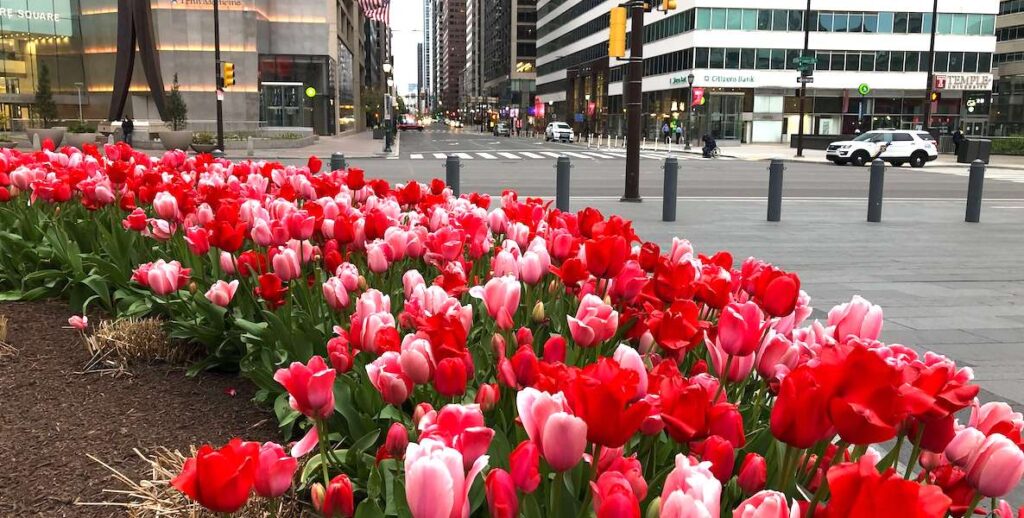![]()
Shall we call this disaster optimism?
Let us hope that Philadelphia can put this awful crisis to good use. While we are all preoccupied with getting back to normal—the businesses that have been shut down, the schools that have been stopped, the human interaction that has been curtailed—there are many things that should not go back to the way they once were.
How to turn the problems generated by the pandemic into turning points in local policy
1. Close the digital divide
Access to computers and the internet once were luxuries; they have now become our era’s pen and paper. It’s admirable that Comcast CEO Brian Roberts donated $5 million to help the Philadelphia School District (PSD) distribute some 75,000 computers. Comcast’s Internet Essentials program is free through the end of this school year, and similar programs from Verizon and T-Mobile also provide internet for cheap. But still some 20 percent of PSD students don’t have access to reliable internet, meaning that it’s nearly impossible for those students to do the required three hours of online work each day during quarantine.
While many bemoan that “friends of” school groups fundraise only for schools in well-off neighborhoods, anyone could donate to this cause and that would help spread the support around to every student and remove barriers to getting students the internet they need. (Even despite the low cost of Internet Essentials and programs like it, many households do not take advantage of it). The selected internet provider could also allow households to add an extra $5 onto their monthly bill to auto-donate, which would help most other families with PSD students save about $1,000 per year in internet costs. It would also be a perk to having kids in the PSD, when many young families are moving to the suburbs and other costs, like property taxes, are rising.
2. Create more flexible streets
When the city “reopens” we will need to allow for social distancing. On nice weekends, parks are already getting too crowded to maintain proper separation. During the work week, walking around Center City’s narrow streets with six feet between pedestrians will only be more challenging. And roadways will be clogged with people avoiding public transit.
Big idea: Allow for flexible streets—now and in perpetuity. For residential neighborhoods, this means an expedited and simplified street closure process allowing residential streets to block off traffic, and put a kiddie pool or throw a football right outside their house. For Center City, we could follow New York’s lead, which is opening 100 miles of streets to pedestrians. Or we can go big and make these changes permanent. Paris has successfully limited car use over the last few years, and Milan just hired Bloomberg Associates’ Janette Sadik-Khan to add 22 miles of bike lanes and reduce car usage in the future.
3. Reduce the wage tax
Big idea: Much like you can buy points to lower the rate on a mortgage, the City should offer companies a one-time opportunity to buy wage tax points to reduce their wage tax burden for the next two years. This would bring in much needed cash now, and give employers and employees a boost when they start working again at a lower wage tax rate.
4. Allow independent wine stores
Prior to the shutdown, the Pennsylvania Liquor Control Board could be faulted for its lackluster inventory and prices that seem quite high given its purchasing power. During the crisis, many stores closed, leaving many Pennsylvanians to cross state borders to load up on drinks, or order from out-of-state providers. When they did reopen, the PLCB was accused of neglecting black and brown communities.
Big idea: The idea of taking the PLCB independent has stalled with partisan gridlock. Now is not the time for politics to stand in the way of small business creation and employment opportunities. Moreover, restaurants are suffering and need a faster and cheaper liquor license option. What we need is simple: either a way to create a radically different PLCB or a way to dissolve it.
5. Assist multigenerational living
During the crisis, many young people moved back home with their parents—either so they wouldn’t quarantine alone, or because they lost their jobs and couldn’t pay rent. At the same time, many who were planning to go into a retirement community or nursing home had second thoughts and moved in with their children. Our housing policies and programs are set up to support single-family households, not multigenerational families.
Big idea: Rezone all single-family-only zoning to allow one accessory dwelling unit (ideal for adult children or elderly parents). Or reward it, as we have rewarded homeownership with the Homestead Exemption. Create an accessory dwelling unit exemption and take the accessory dwelling unit out of the house’s assessed value, reducing the taxes on the house while still increasing its overall property value.
6. Renovate our schools
Before the pandemic, seven Philadelphia schools were already closed. They were grappling with a different disaster: an abundance of asbestos in flooring and walls, and other environmental concerns like mold.
Whatever next steps we take for the city, we must recognize that there is a once-in-a-generation chance to do things differently. The best way to honor all the people, jobs, and experiences lost in this pandemic is to create a better city out of it.
Diana Lind, executive director of the Arts + Business Council for Greater Philadelphia, is a Citizen board member. Her new book, Brave New Home: Our Future in Smarter, Simpler, Happier Housing, comes out in October 2020.

